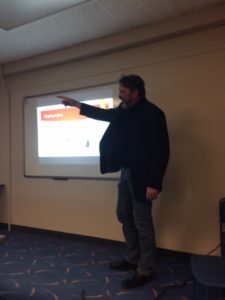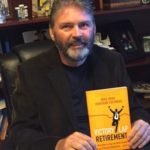
After having talked to numerous Baby Boomers lately, I’m convinced more than ever that the majority of we boomers really don’t want to retire, we just need a change, and some help figuring out what to do with the rest of our lives.
In this article I would like to share my thoughts on why some people feel the need for a significant change late in their careers and why traditional retirement is not the answer. I know these feelings because it happened to me. And I’ve been telling the story at a number of presentations Jonathan and I have conducted at various branches of the Toronto Public Library in recent weeks.
The photo shows one such presentation at the York Woods branch on Victory Lap Retirement, followed by a Q & A session. I love doing these presentations, as it gives me an opportunity to present to my fellow boomers and find out what is going on out there in the real world.
I Started Feeling Antsy Late In My Career
There were a number of reasons for the change I made and here they are in no particular order:
1.) I became very good at doing my job. This naturally happens when you do the same job for twenty plus years. You get comfortable, there is little challenge and you plateau.
2.) After 36 years of work I was tired of taking orders and being told what to do.
3.) I became bored with my job. That is what happens when you turtle and continue to play safe. I wasn’t learning anything new and I didn’t derive any satisfaction (happiness) from my job. The thrill was long gone and winning more sales contests and trinkets didn’t matter to me anymore. I remembered laughing a lot more earlier in my career. I knew I needed to laugh more before it was too late.
4.) I lost my sense of purpose. When I was going through ‘The Big Dip” I had a strong sense of purpose, attaining security for my family, paying the mortgage, saving up for the kids education and putting some money aside for my own eventual retirement. This sense of purpose which I had lived with for so many years faded the closer I got to achieving financial independence and needed to be replaced.
5.) The values of the company changed and no longer aligned with mine. We were no longer on the same page. I no longer felt that I could help people the way that I wanted and they needed help. I really enjoyed the relationships with customers that I had built up over the years but I was no longer confident I could provide the support they wanted/needed, as all the focus was now being put on generating new business. I felt like a gladiator who was thrown into a ring to compete with others like me. I was good at winning but didn’t derive any personal satisfaction from it. I didn’t want to fight for their amusement anymore. I didn’t want to compete anymore. I was done.
So What Did I DO?
I considered the possibility of retiring because that is what I was led to believe everyone does at this point in their lives, but I’ve come to realize that this is wrong. There is danger in following the retirement herd (status quo) these days. Traditional retirement no longer works and I really don’t believe it’s natural for people to retire before their time. It just doesn’t feel right to me or for me.
Traditional retirement worked when the concept was invented about a 100 years ago. Back then most people worked in factories and the jobs were physically taxing. Retirement was created so the factory owners could replace older, slower workers with a more productive, cheaper model. And it worked because life expectancies were much shorter and most workers only lived for a few years after retiring. They were physically used up and were happy to just rest, sit back in a rocking chair and watch the world go by.
The Problem
Today most jobs are not as physically taxing as they were a hundred years ago. Many people work in offices, they are knowledge workers and because of that they are not physically spent. The problem is knowledge workers’ minds are not worn out when the traditional retirement age hits. The brain still wants to learn new things, interesting things, it doesn’t like being bored and it sure as hell doesn’t want to spend a lot of time in front of the TV watching Seinfeld re-runs. Doing that to your mind for a prolonged period will eventually kill it and who wants to die before their time?
Traditional retirement doesn’t work for people with a healthy active mind, for people that might have another 30 plus years to go. What people need is challenge, and purpose and that is exactly why traditional retirement does not work for me.
The Opportunity
Living longer can be either a blessing or a curse; it all comes down to what you do with it. I look at increased longevity as a gift, as an opportunity to finally do what I like doing. For me that means finding meaningful, fulfilling work, work that gives me a good reason to get out of bed in the morning and work that can generate some active income for me. After a period of self-reflection I decided to create my own job and finally become my own boss. One of the best decisions I ever made!
 Mike Drak is an author, blogger and speaker based in Toronto. He can be reached at michael.drak@yahoo.ca. Victory Lap Retirement, co-authored with Hub CFO Jonathan Chevreau, is available online and on Kindle and Kobo ebooks, where it is a bestseller. The paperback edition is available in Chapters Indigo and many independent bookstores, as well as Costco, and the book has been on the Globe & Mail bestseller list. This blog originally ran on Mike’s blog on February 16th and, with slight edits, is reprinted here with permission.
Mike Drak is an author, blogger and speaker based in Toronto. He can be reached at michael.drak@yahoo.ca. Victory Lap Retirement, co-authored with Hub CFO Jonathan Chevreau, is available online and on Kindle and Kobo ebooks, where it is a bestseller. The paperback edition is available in Chapters Indigo and many independent bookstores, as well as Costco, and the book has been on the Globe & Mail bestseller list. This blog originally ran on Mike’s blog on February 16th and, with slight edits, is reprinted here with permission.


Good article. Agree 100%. Luckily I choose a profession/job that I still enjoy lots and I’m 65. I like the intellectual stimulation and the problem solving aspects of my job. There will always be new problems to solve. I think there is a missing word in this sentence – The problem is knowledge workers’ minds are (s/b NOT) worn out when the traditional retirement age hits.
Thanks, I’ll fix that
Excellent article–good insights comparing retirement in the industrial age to retirement now. You articulated well what I’ve been feeling and doing. I “semi-retired” from the corporate rat race a few years ago feeling a lot of what you describe in this article. Looking back, I think I was burnt out long before I took the leap to learn something new and get really good at it. I’d always had a passion for real estate and I’ve found great success in the field. I love what I’m doing and every day I learn something new and enjoy applying what I’ve learned in my previous career to a whole new marketplace.